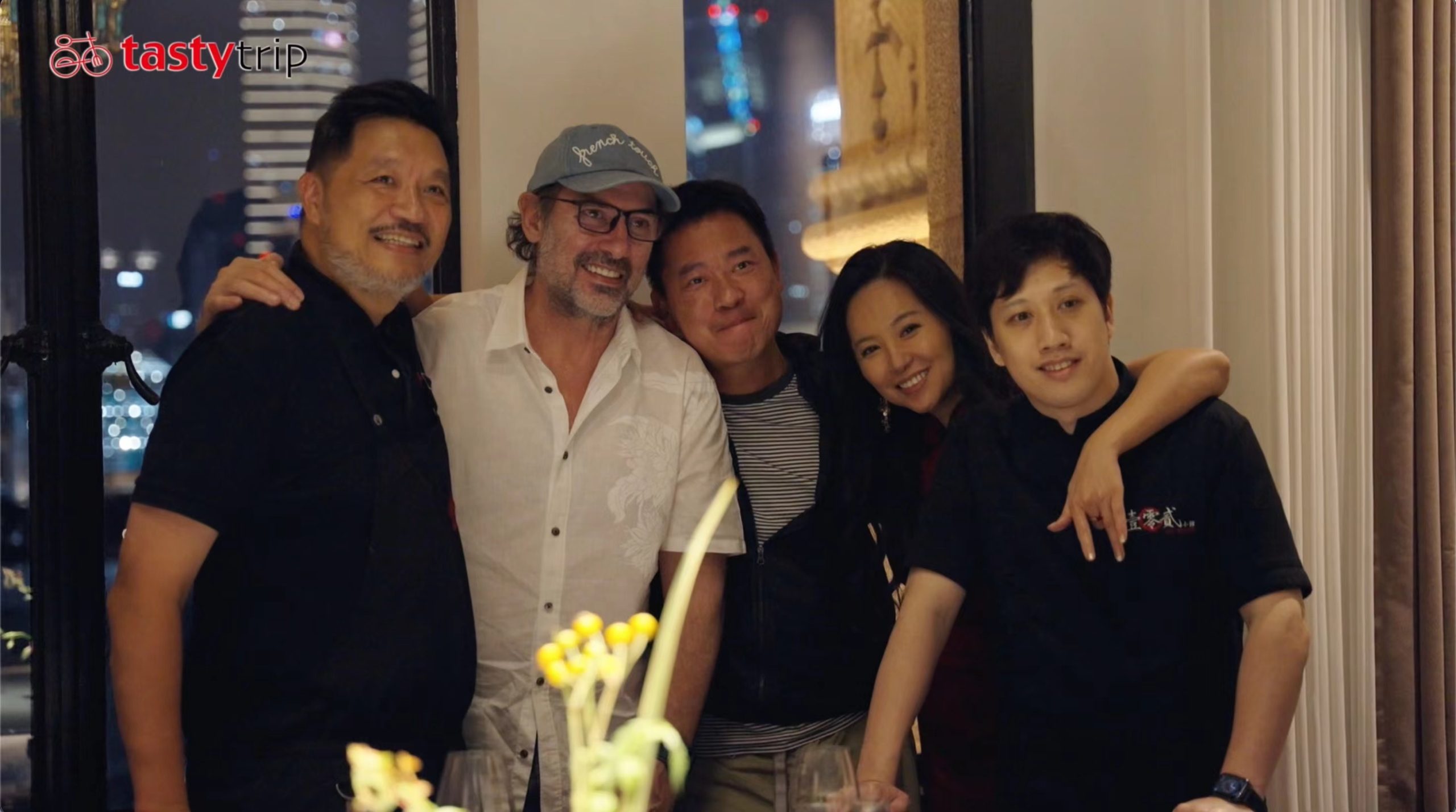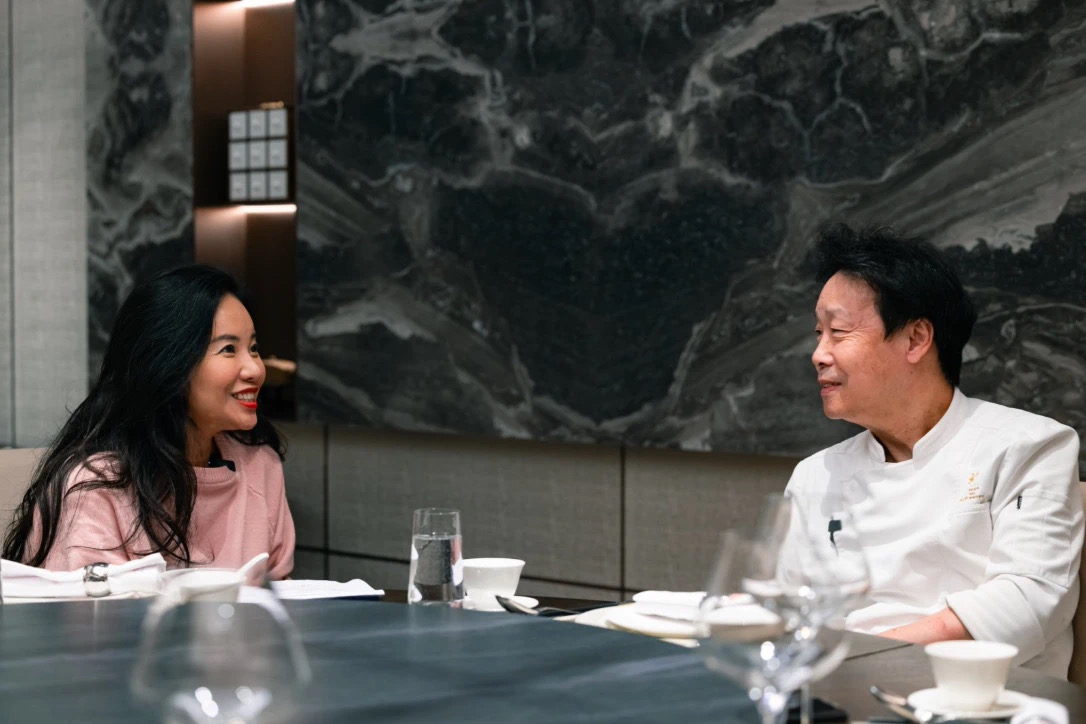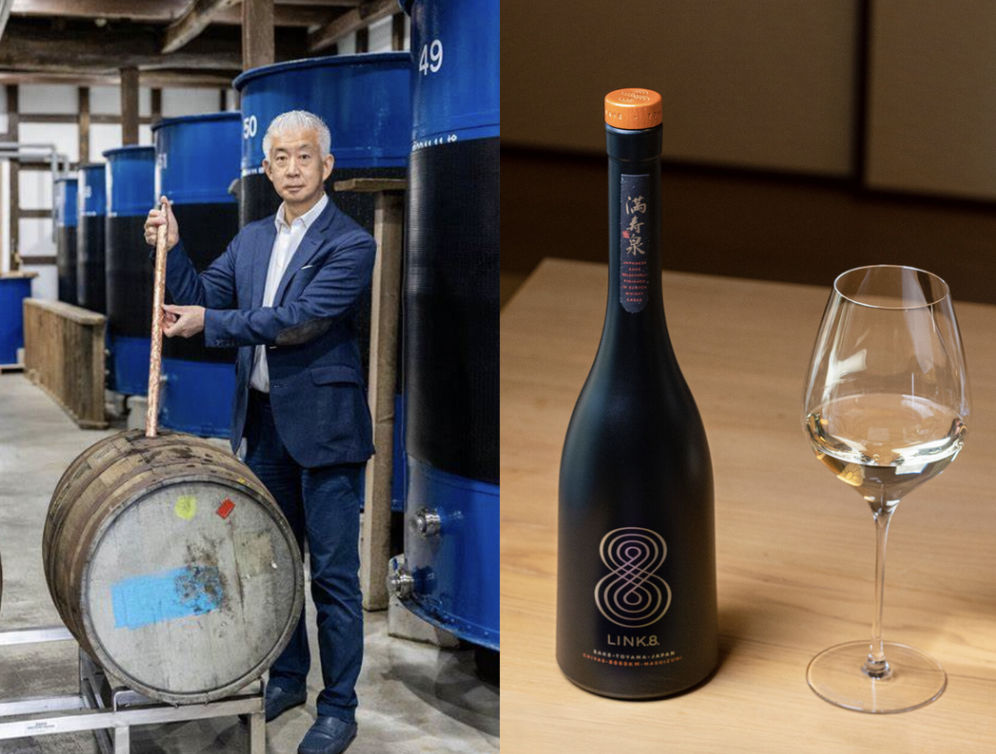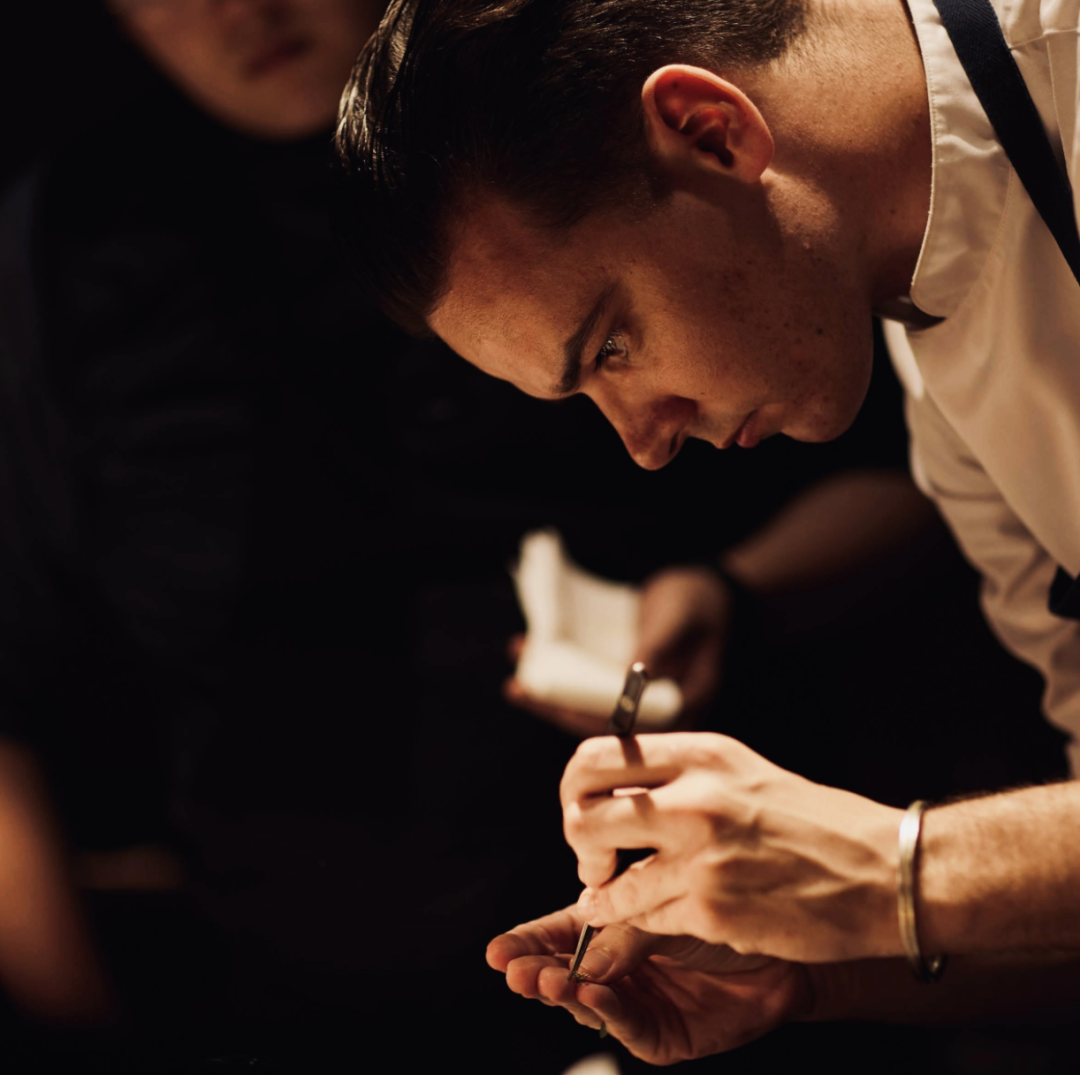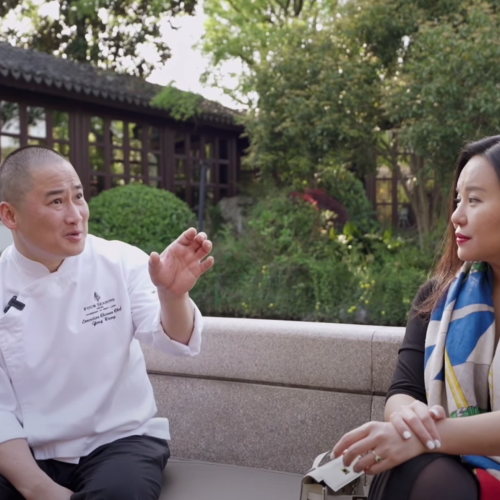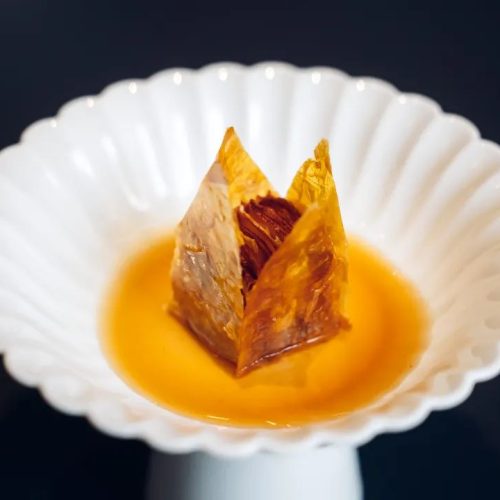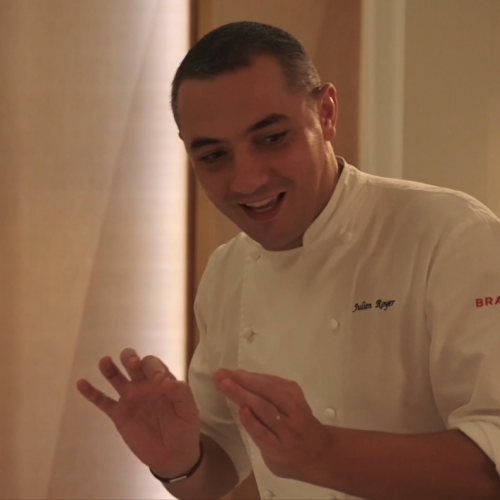@Jocelyn華姐的TastyTrip YouTube
Mr Danny Yip, the mastermind behind The Chairman, shares his observations on the changes in Chef Xu over the years. He says, “Chef Xu has always had that fire in his belly, but in addition to that, his techniques have greatly improved and ideas expanded. Perhaps it has something to do with him moving to Shanghai, a bustling metropolis that can broaden one’s horizons.” When recalling their first collaboration, Chef Xu says, “It was January of 2018, and it’s already been five years.” Danny jokes about the feeling of “getting old,” to which Chef Xu responds, “Danny, you’re still as young as ever.”
Chef Xu admits that Mr Yip’s influence on his path as a chef has been profound. Before meeting Mr Yip in person, Chef Xu had been following his’s column articles and was captivated by the kitchen lore and food stories described. One quote was particularly mentioned: “Mastering two woks is better than going to university.” To Chef Xu, this meant that truly mastering the art of cooking with two different woks might carry more significance than obtaining a university education. This kind of reverence and love for cooking deeply moved Chef Xu.
 Mr. Danny Yip (Left) and Chef Xu Jingye (Right)
Mr. Danny Yip (Left) and Chef Xu Jingye (Right)
Recalling his encounter with Danny, Chef Xu says, “I never imagined that one day I would have the opportunity to meet Mr Yip, let alone collaborate with him on a four-hand.” Due to travel restrictions caused by Covid, the duo of chefs hadn’t meet each other in person, but they found a way to keep in touch. Chef Xu explains, “Though we were unable to meet up during Covid, we had each other’s WeChat. He would talk to me on WeChat from time to time, and ask me if I were working on any new dishes.” Now they are finally able to reunite and work together again, which makes Chef Xu incredibly happy.
Danny follows up, “During the pandemic, chefs had limited activities. If we really put our hearts into research, the past three years would have been sufficient for us to develop some good dishes. Because we’d only have one thing to focus on – cooking.” Danny highly praises their collaboration at 102 House, noting, “102 House exudes a warm and cozy dining experience. Working with team 102 House was seamless, and we had great interaction.” Danny goes on to affirm Chef Xu’s progress, “He has improved significantly, and it’s not just him; the entire restaurant team has made great strides as well.”
 102 House
102 House
Everything at the themed dinner was honed by the two chefs together. Chef Xu says they were constantly revising the menu because they wanted to give diners the best experience. “We want to make it the best it can be,” says Chef Xu, “Even though we’ve set the direction, we still want to utilise every minute to make it better. This involves multiple adjustments such as flavours, elements added or removed.” Each dish is injected a heavy dose of soul.
The opening eight small plates are a new interpretation of traditional cold dishes. Danny talks about his special feelings towards Shanghainese food: “I grew up eating Shanghainese food in Hong Kong, but my family mainly cooked Cantonese food. That’s why I’ve wanted to combine the techniques of Cantonese cuisine with culinary elements of Shanghai for a long time.” He reveals that they revised two dishes the night before the menu was finalised. Chef Xu adds, “It was almost one in the morning when we decided to change these two dishes.”
 Eight Small Plates
Eight Small Plates
The “eight small plates” is an idea Danny wanted to realize. He noticed that restaurants in Shanghai would serve several small cold plates once guests are seated, which is not the case in Cantonese cuisine. So he wanted to introduce this tradition and do more with it, hence the concept of “eight small plates” on which Danny shared his thoughts and innovations. At The Chairman, they have never formally served cold dishes or amuse bouche, mentions Danny.
Danny says, “The cold dishes we eat are often just sidekicks; they’re a great tradition but rarely outstanding.” He wants to break away from that stereotype and try to give each small plate its own character. To achieve this, Danny says he spent a lot of time thinking about how to make each of these dishes attractive. He wants guests to be pleasantly surprised as soon as they sit down. “Most of the time, people don’t remember what exactly they ate in the amuse bouche. But I want my cold dishes to be memorable.”
Danny shares a very special dish from the “Eight Small Plates” – Spinyhead Croaker with Black Bean Sauce. The dish is inspired by his childhood memories. “This is a classic fare of the 1980s in Hong Kong. We had this fried fish called dace bathed in black bean sauce which was often eaten straight from the can. The younger generation may not have tried it, but for me, it is an unforgettable memory. I have been wondering how I can transform this household dish into a Fine-Dining version.” This time in Shanghai, they used a particularly small type of croaker called spinyhead. He says, “We used over 300 spinyheads to make this dish. First, we deep fry the fish, then we make a richly flavoured black bean oil, and we soak the fried fish in the oil for a few days.” It retains that special taste of canned dace, but even better because of its tender texture.
 Dishes fromEight Small Plates
Dishes fromEight Small Plates
From homemade steamed eggs to premium abalone soup, I keep asking Danny and Chef Xu to share some of their favorite dishes. Danny starts with the Corn Juice Steamed Eggs, “This is a dish that I’m particularly fond of. Simply put, it’s steamed eggs mixed with corn juice. For Cantonese people, steamed eggs is a household dish that everyone knows how to make. I want to bring a taste of home to Shanghai.”
“Gourmet Mr Chua Lam once asked me what I would make if I were given an egg. I said steamed eggs with corn juice. Of course, at that time I was just saying. But this time I really made it and diners loved it. It’s elegant, flavourful, and nostalgic.” Chef Xu then shares, “One of my favourite dishes is the abalone soup. The soup is made from hundreds of abalone that have been simmered for a long time and has a very rich tang, coupled with dried softshell turtle skirts and fresh softshell turtle liver. Many people may not know that the texture and flavour of softshell turtle liver is even better than goose or duck liver.” Danny also speaks highly of the soup, “It is very powerful, and the best you can get from abalone, so to speak.” Chef Xu adds, “Everyone raved about it and many wanted to have some more. It’s a pity we can’t keep up with the demand because the preparation is really time-consuming.”
 Corn Juice Steamed Eggs
Corn Juice Steamed Eggs
The triumph of this dinner is Braised Pork with Preserved Vegetables & Stewed Sea Cucumber, echoing the dinner theme and showcasing a seamless fusion of Cantonese and Zhejiang cuisine. Braised Pork with Preserved Vegetables is a classic dish in Zhejiang, which perfectly complements the specialty of Guangdong – teat sea cucumber, in a way that achieves a subtle balance of mouthfeel and flavour. Danny adds, “The combination of fatty pork and sea cucumber is the trick, because they are so similar in texture that it is difficult to distinguish between the two. This kind of subtlety is truly fascinating.” At the dinner, knowing there would be a main course, I couldn’t resist asking for a bowl of rice.
Danny notices that the image of Chinese cuisine has been given more importance. “Many of our friends overseas are talking about well-known Chinese restaurants such as Yong Fu and Xin Rong Ji. They have a global vision, and the influence of Chinese cuisine has indeed increased.”
Danny states that he couldn’t speak for other restaurants, but he values the uniqueness of a restaurant. “Finding and maintaining originality and what’s unique about a restaurant is the first step towards internationalization.” He believes that Chinese cuisine should focus more on originality rather than imitation. “Restaurants in other countries highly emphasize innovation; the personality of the chef is fully represented in the dining experience. If we want Chinese cuisine to become more internationalized, maintaining originality and uniqueness is crucial.” He further explains, “The diversity and vibrancy of Chinese cuisine should be better represented, with various terroir, character, and creative forms.”
In recent years, the unique charm of Chinese food is finally gaining global recognition. When neon lights started to shine through the night, a culinary exchange between friendship and craftsmanship began, one that’s harmoniously blended with style and elegance. This is the true essence of a four-hand. As dishes were served one after another, guests were left amazed and satisfied, enjoying each other’s company.
Undoubtedly, this is the most unforgettable four-hand dinner held by far in Shanghai this year.
 The Author and Mr. Danny Yip (Left) and Chef Xu Jingye (Right)
The Author and Mr. Danny Yip (Left) and Chef Xu Jingye (Right)
Photo: Allstar Communications、102 House


